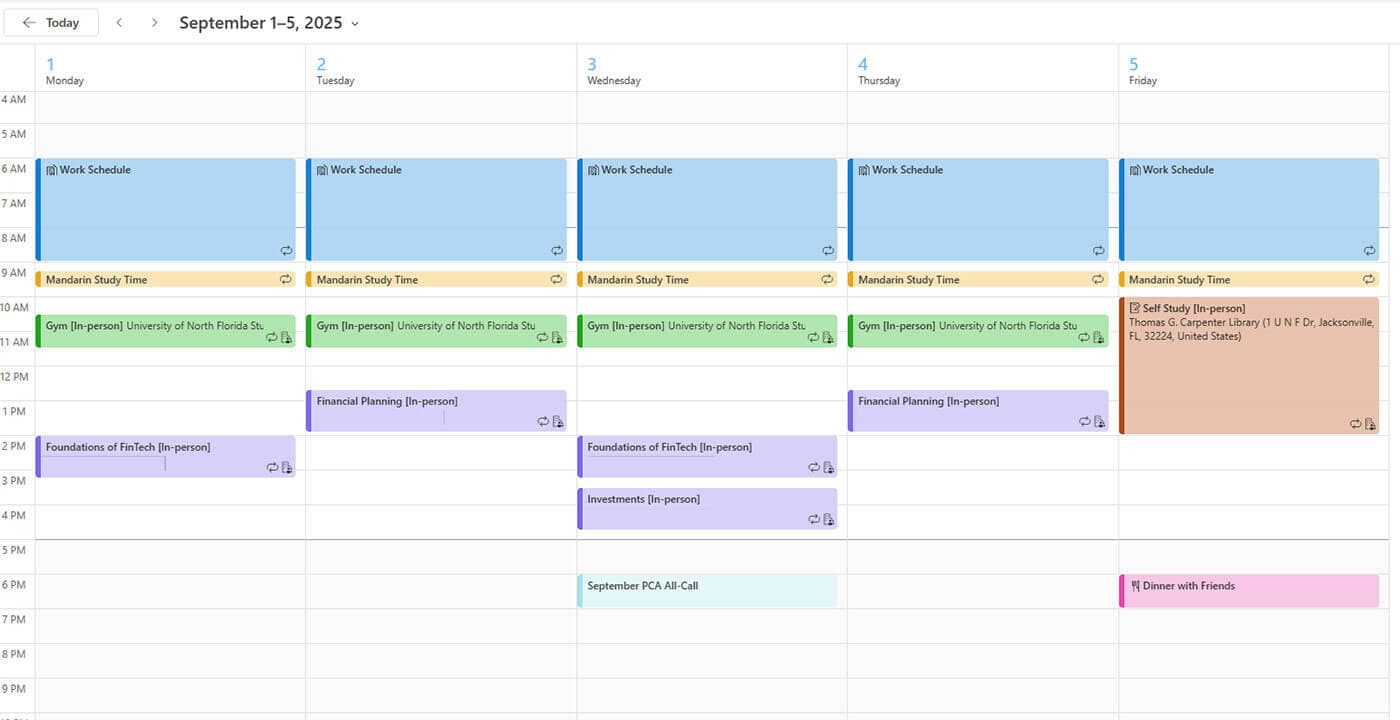
How to Balance Your 3 S’s: School, Sleep, and Social Life

When I came to college, I was told there are three S’s: school, sleep, and social life… but the catch is you can only have two. While there are times that certainly feel like the case, creating good organization and time management skills can help you maximize your college experience. What I have found to be most helpful throughout college is creating a calendar system that works for me, scheduling times to do certain projects that are during my peak hours of performance, and realizing the importance of intentional rest even in the midst of crazy schedules.
Find The Best Calendar for You
How many times have you gotten a physical calendar and after one month you stop writing in it? We have all been there. Finding the right kind of calendar for you is key to keeping on track. If you know you are prone to stop using a physical calendar, try a digital one like Google Calendar or Outlook. At the beginning of the semester type in all of your deadlines for assignments along with known events like club meetings, classes, concerts, or trips. Set alerts that will automatically pop up on your home screen to ensure that you actually have to take a look at your calendar. What I have found to be most helpful is at the beginning of every month briefly reviewing my calendar for that month to make sure I'm aware of all upcoming dates and plan accordingly.
Personally, I like to use two calendars. One is a monthly calendar on my desk that I use to add all of my assignment deadlines as well as any holidays or upcoming events. The other is a small physical calendar that has a weekly view that allows me to plan out what I will do on each day.
Strategize Your Studying
Scheduling times to do certain projects that are during your peak hours of performance will help you with mental fatigue. For example, if you have a textbook chapter you have to read, a discussion post, and a quantitative assignment to do, be strategic on planning when to do these assignments. It takes a lot more focus to read a textbook chapter or to do a quantitative assignment than to write a discussion post. If you find you are able to focus the most in the morning, try knocking out the textbook chapter or quantitative assignment first, take a break, and save the discussion post for a time in the day you aren't as alert.
Additionally, I know I get overwhelmed by the number of tasks that are on my to-do list, which easily leads to procrastination. Try setting an alarm on your phone for a short period of time like 30 minutes and just start a task. It will make it seem smaller and easier to start when you know you only are going to work on it for a brief amount of time. Moreover, this can also help when you have other tasks like cleaning your room or folding laundry. By setting a 5–10-minute timer you know that you are dedicating that specific time to it, which gives you more incentive to complete it within that time.
Rest Is Productive
Lastly, rest! Unfortunately, burnout is very common among college students, especially towards the end of the semester. The best way to avoid burnout is by taking time to intentionally rest throughout your week. This means finding ways to recharge, which looks different for everyone! Some examples might be to read a book, go on a walk, work out, listen to music, hang out with friends, journal, or cook. Finding times in your schedule to incorporate breaks like this is essential. It might seem like there is no time for this, but by adding rest into your schedule you will be more productive and have more energy throughout your week. Maybe you have an hour chunk during the week or split up that hour throughout your week. Find what works for you and make sure you prioritize it!
Start early in the semester to establish effective time management balanced with plenty of rest. This will lay the foundation to productive habits that will help you maintain student success throughout the school year!
Do you have a compelling story or student success tips you’d like to see published on the Pearson Students blog? If you are a college student and interested in writing for us – click here to pitch your idea and get started!
About the author

Ambyr Dack
Ambyr Dack is a student at Florida State University double majoring in Human Resource Management and Marketing. Ambyr is involved in two organizations on her campus, the Society for Human Resource Management and the FSU Navigators. Aside from school and organizations, Ambyr loves to read, cook, spend time with her friends, and go to concerts. She is a Pearson Campus Ambassador at her university.


